On more than one occasion, on guided fishing trips, I've found myself in the boat with another angler that seems to have arrived at the water determined not to listen to our guide. It's never clear why. Maybe the angler thinks he knows better than the guide. Perhaps he simply has a problem with authority. Whatever the case, by the end of the day, it is always abundantly clear that the angler has done little more than sabotage his or her own day. Almost without exception, your guide knows best. For a myriad of reasons, when heading out on a guided trip, being an attentive and compliant angler will not only improve your day but will likely improve your angling as a whole.
Knowledge
Unless you're a local expert on the stream, river or flats you're about to embark upon, your guide spends a ridiculously greater amount of time on said water than you do. The guide knows the riffles and runs, the way minor changes in conditions from day to day affect the fishing, the best tactics for certain spots and times and so on.
Earlier this year, while fishing the Elk River in British Columbia, our guide -- and owner of Fernie's Elk River Guiding Company -- Paul Samycia parked our driftboat in a small, slow back eddy that had formed alongside a torrid run. A long, heavy but relatively shallow riffle above was channeled by the narrowing streambanks where it dropped off a small spillover into a deep pool. The result was a 20 yard stretch of heavy rapids that I'd scarcely have thought to throw a nymph or streamer into, thanks to the ripping flows. As I peered out at the deep, emerald water, Paul handed my rod back to me with a small ant -- probably size 18 -- tied to the end of the line.
"Seriously?," I inquired. Paul nodded yes, and I obliged, tossing a half-assed reach mend into the line as I threw out a cast, hoping to get 10 feet of drift before the currents sucked the tiny ant under. That's about what I got. The next cast yielded about the same, and the third maybe a hair more. The fourth cast yielded a handsomely fat 22" westslope cutthroat, and so did about 8 or 9 other casts that afternoon, as my boat mate and I sat perched in that back eddy for the better part of an hour tossing ants into rushing water that I might passed over altogether had I been fishing on my own.
Sight
I'm a lousy fish spotter. Not in freshwater, but in the salt. Mostly this is because I haven't been sight fishing in salt water that often. But even though this is the case, I still find myself doubting my guide's eyes from time to time. But, instead of being reluctant to toss casts where the guide instructs, as I've seen some anglers do -- I make a wise crack, do my best to get distance and direction from the guide and launch a cast at the fish I can't see.
More often than not, this results in me spotting the fish shortly thereafter or even occasionally with a hookup on a fish I never saw. I'm not under the delusion that I'll see even a fraction of the fish my guide will, even if part of me refuses to believe they're not full of shit some of the time.
This summer, while fishing on a slow striper day on the flats surrounding Chappaquiddick Island in Massachusetts, guide Jaime Boyle repeatedly instructed me to toss short, 40 foot casts at the side of a rock we were anchored near. Jaime insisted that there was a nice striper perched off the back of the rock. The water was crystal clear and the sun angle was perfect, illuminating the scene well. My eyes saw no fish. After probably 10 casts -- most of which were on target -- nothing had happened. But Jaime insisted I keep hitting the spot, noting that the fish hadn't spooked. I tossed 3 or 4 more casts. Nothing. "One more," Jaime insisted. Though I had already explained to Jaime several times that he was seeing things, I reiterated this belief and tossed one more. Fifteen seconds or so later, I was into my backing on a striper for the first time ever.
Guides see things you don't. Lots of things.
Experience
It doesn't matter whether you've been fishing for 5 years or 50 years, guides have the experience. At least, that's what you're paying for. If you think your guide is a snot-nosed kid or little more than a taxi service for the day, then you've hired the wrong guide or misunderstand entirely what guiding is all about. Guides are fountains of information on the fishery you're targeting and have spent potentially countless hours amassing knowledge that they are almost always eager to share with their clients. Learning to become a better angler is very largely about trial and error, and guides have put long days on the water running experiments. The knowledge they have acquired should be pored over and plied through the way any good angling book would be.
Value
Does any of this mean that you can't contribute to the discussion? Share your thoughts and help determine the course of the day? Certainly not. And any good guide will encourage this. But, it speaks to how you should approach things and what you should seek to take away from the experience.
Ultimately, it's your money. You're the customer. But, chances are, if you're not approaching every guided trip as an opportunity to learn and become a better angler, you're not getting the proper value for the dollars you've dropped. If being catered to and having your guide follow the "customer-is-always right" mantra is more important than enjoying the day, catching fish and becoming a better angler, then you're missing the point. But, like I said, it's your money.


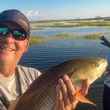
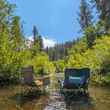


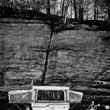
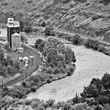

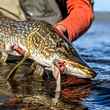

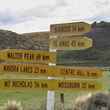
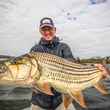



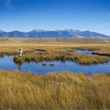
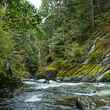

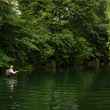

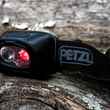
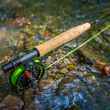

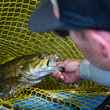

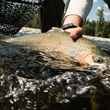
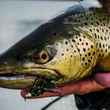


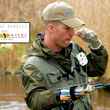
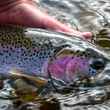
Comments
Bill Crumrine replied on Permalink
Back in 2006, on my first trip to Alaska, I learned the best thing is to talk with your guide about things you are not comfortable in doing. Naturally, being a Texas bass angler, all my life, fly-fishing was something totally new to me, though I had taken some lessons previously, but never really followed-up on this particular aspect of angling.
I told the guide, I was not comfortable and preferred spinning, but the guide had the fly rods & reels rigged for sockeye salmon. I fumbled with the fly rig for several hours and was the only one not catching fish.
After a while, the guide said let's do some trout fishing, handing me a spinning rod rigged with a neon-green and chrome Hot Spot lure, while he back trolled. He explained how the rod tip would vibrate slightly and if a fish hit the rod would do a deep bend. In a matter of minutes It hooked a six-pound Dolly Varden. The "Dolly" was netted and after few photos, released. Shortly thereafter, with the same rig, I hooked an eight-pound, 26" Dolly Varden and on the third cast, I hooked a five-pound Dolly.
That made my day and I was in seventh heaven for several days afterwards.
It wasn't until, my 2014 trip to Alaska where I really started mastering fly fishing and now I am really into that fishing aspect.
Tell the guide what your comfortable with and then have him handle everything from there. I found guides are there to help, so tell them all you are comfortable with and they can handle it from there.
Pages